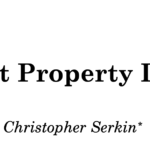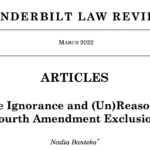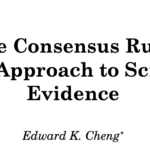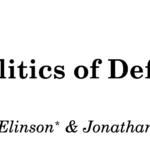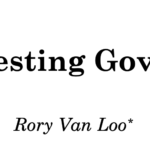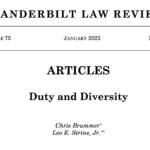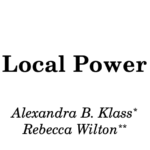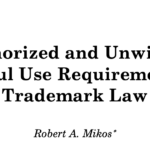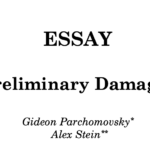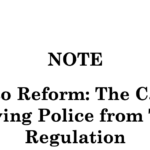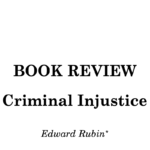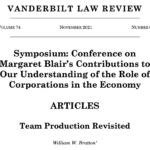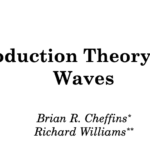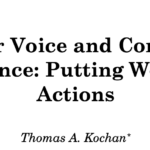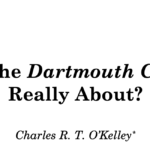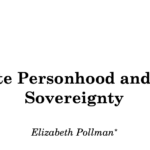Articles Category
What Property Does
Apr. 21, 2022—Christopher Serkin | 75 Vand. L. Rev. 891 (2022) | For centuries, scholars have wrestled with seemingly intractable problems about the nature of property. This Article offers a different approach. Instead of asking what property is, it asks what property does. And it argues that property protects people’s reliance on resources by moderating the pace of...
Police Ignorance and (Un)Reasonable Fourth Amendment Exclusion
Mar. 22, 2022—Nadia Banteka | 75 Vand. L. Rev. 365 (2022) | The Fourth Amendment exclusion doctrine is as baffling as it is ubiquitous. Although courts rely on it every day to decide Fourth Amendment violations as well as defendants’ motions to suppress evidence obtained through these violations, virtually every aspect of the doctrine is a subject of...
The Consensus Rule: A New Approach to Scientific Evidence
Mar. 22, 2022—Edward K. Cheng | 75 Vand. L. Rev. 407 (2022) | Founded on good intentions but unrealistic expectations, the dominant Daubert framework for handling expert and scientific evidence should be scrapped. Daubert asks judges and jurors to make substantively expert determinations, a task they are epistemically incompetent to perform as laypersons. As an alternative, this Article...
The Politics of Deference
Mar. 22, 2022—Gregory A. Elinson & Jonathan S. Gould | 75 Vand. L. Rev. 475 (2022) | Like so much else in our politics, the administrative state is fiercely contested. Conservatives decry its legitimacy and seek to limit its power; liberals defend its necessity and legality. Debates have increasingly centered on the doctrine of Chevron deference, under which...
Stress Testing Governance
Mar. 22, 2022—Rory Van Loo | 75 Vand. L. Rev. 553 (2022) | In their efforts to guard against the world’s greatest threats, administrative agencies and businesses have in recent years increasingly used stress tests. Stress tests simulate doomsday scenarios to ensure that the organization is prepared to respond. For example, agencies role-played a deadly pandemic spreading from...
Duty and Diversity
Jan. 24, 2022—Chris Brummer & Leo E. Strine, Jr. | 75 Vand. L. Rev. 1 (2022) | In the wake of the brutal deaths of George Floyd and Breonna Taylor, lawmakers and corporate boards from Wall Street to the West Coast have introduced a slew of reforms aimed at increasing Diversity, Equity, and Inclusion (“DEI”) in corporations. Yet...
Local Power
Jan. 24, 2022—Alexandra B. Klass & Rebecca Wilton | 75 Vand. L. Rev. 93 (2022) | This Article is about “local power.” We use that term in two distinct but complementary ways. First, local power describes the authority of local governments to enact regulatory policies in the interests of their citizens. Second, local power describes the authority of...
Unauthorized and Unwise
Jan. 24, 2022—Robert A. Mikos | 75 Vand. L. Rev. 161 (2022) | For decades, the United States Patent and Trademark Office (“PTO”) has required trademark owners to comply with sundry nontrademark laws governing the sale of their trademarked goods and services. Pursuant to this “lawful use requirement,” the Agency has refused or even cancelled registration of thousands...
Preliminary Damages
Jan. 24, 2022—Gideon Parchomovsky & Alex Stein | 75 Vand. L. Rev. 239 (2022) | Historically, the law helped impecunious plaintiffs overcome their inherent disadvantage in civil litigation. Unfortunately, this is no longer the case: modern law has largely abandoned the mission of assisting the least well-off. In this Essay, we propose a new remedy that can dramatically...
Road to Reform: The Case for Removing Police from Traffic Regulation
Jan. 11, 2022—Aaron Megar | 75 Vand. L. Rev. En Banc 13 (2022) | This Note advocates for the removal of police from traffic-law enforcement and the creation of unarmed Civilian Traffic Forces (“CTF”) at the municipal and state levels. Since the Supreme Court’s decision in Whren, there has been a significant amount of legal scholarship criticizing...
Criminal Injustice
Jan. 11, 2022—Edward Rubin | 75 Vand. L. Rev. En Banc 1 (2022) | Reviewed: JED S. RAKOFF, WHY THE INNOCENT PLEAD GUILTY AND THE GUILTY GO FREE: AND OTHER PARADOXES OF OUR BROKEN LEGAL SYSTEM, Farrar, Strauss & Giroux 2021. Pp. 208. $27.00 Hardcover. As its title suggests, Why the Innocent Plead Guilty and the Guilty...
Team Production Revisited
Nov. 24, 2021—William W. Bratton | 74 Vand. L. Rev. 1539 (2021) | This Article reconsiders Margaret Blair and Lynn Stout’s team production model of corporate law, offering a favorable evaluation. The model explains both the legal corporate entity and corporate governance institutions in microeconomic terms as the means to the end of encouraging investment, situating corporations within...
Team Production Theory Across the Waves
Nov. 24, 2021—Brian R. Cheffins & Richard Williams | 74 Vand. L. Rev. 1583 (2021) | Team production theory, which Margaret Blair developed in tandem with Lynn Stout, has had a major impact on corporate law scholarship. The team production model, however, has been applied sparingly outside the United States. This article, part of a symposium honoring Margaret...
Worker Voice and Corporate Governance: Putting Words into Actions
Nov. 24, 2021—Thomas A. Kochan | 74 Vand. L. Rev. 1625 (2021) | The encouraging news is that in 2019 the Business Roundtable recanted on its 1997 statement. Its members recognized that prioritizing shareholder value had gone too far; now they again endorsed the principle that a corporation should be held responsible for addressing the interests of not...
What Was the Dartmouth College Case Really About?
Nov. 24, 2021—Charles R. T. O’Kelley | 74 Vand. L. Rev. 1645 (2021) | In 1769, King George III issued a Royal Charter incorporating twelve persons as The Trustees of Dartmouth College with the right of self-perpetuation. The charter also identified one of the trustees, Eleazar Wheelock, as the founder and initial president of the corporation, with the right...
Corporate Personhood and Limited Sovereignty
Nov. 24, 2021—Elizabeth Pollman | 74 Vand. L. Rev. 1727 (2021) | This Article, written for a symposium celebrating the work of Professor Margaret Blair, examines how corporate rights jurisprudence helped to shape the corporate form in the United States during the nineteenth century. It argues that as the corporate form became popular because of the way it...
